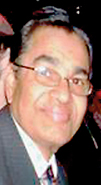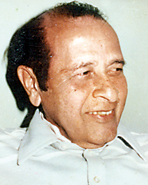Behind closed doors
The four years and four months that K.H.J. Wijayadasa served as Secretary to President Ranasinghe Premadasa were a turbulent period in the history of the country. As President, Premadasa inherited a country beleaguered by civil strife in both the north and south; he was hounded by his political opponents almost from the time he took office and his end came, suddenly and tragically, when he was assassinated by a suicide bomber on May 1, 1993.
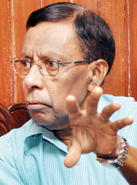
K.H.J. Wijayadasa: Memories of public life and more
Being the Secretary to the President through those challenging times, Mr. Wijayadasa was well placed to observe firsthand the closed door scenes that took place during the period that President Premadasa held the highest office in the land. In his book “Governance, Heritage and Sustainability”, which will be launched next Thursday, November 15 at the Lakshman Kadirgamar Institute auditorium, Mr. Wijayadasa gives a brief personal glimpse of the former President and his style of governance, the merits and demerits of which are hotly debated even today.
In the chapter titled “The Rise and Fall of President Ranasinghe Premadasa”, his former Secretary paints the picture of a man he admired for many of his qualities and to whom he refers as a “human dynamo” but at the same time discloses what he saw were the President’s two main weaknesses. “He did not trust anyone, he was not diplomatic.”
Two years after taking office, President Premadasa faced his biggest political challenge, an impeachment motion brought against him with the support of a substantial number of members of his own United National Party (UNP). While the grapevine had been abuzz of an impending impeachment motion for many weeks, it fell on Mr. Wijayadasa to inform the President that a motion against him had been formally entertained by the Speaker of Parliament.
“The day was August 28, 1991. The Cabinet meeting was held at 6 in the evening those days and was in progress when I received a call from (Speaker M.H.) Mohamed saying he had an urgent letter for the President and wanted it delivered to him immediately. I informed him that the Cabinet meeting was in progress and hence the letter would be given after the meeting was over. Mohamed then said he was sending the letter through one of his security officials and to hand it over promptly. When I asked him if it is the impeachment notice, he laughed and did not answer.”
Once the letter arrived at the office, Mr. Wijayadasa telephoned the lobby area in the Cabinet office and asked the ‘Arachchi’ who answered the phone to inform the President that he had an urgent letter for him.“He (Premadasa) stopped the Cabinet meeting and came to the phone and asked me, “What is it, Wijayadasa?” When I told him I had received a letter from the Speaker, he directed me to open the letter and read it out to him over the phone. When I finished, he sounded completely normal and unruffled.”
The President returned to the Cabinet meeting and as the last item of the day, took up the issue of the impeachment motion. “Did anyone present here sign the impeachment motion?” President Premadasa asked. No one owned up, even though some of the well known movers behind the impeachment were present in the room, recalls Mr. Wijayadasa.
In his book, while the chapter on the former President is an instant attention-grabber, the respected civil servant devotes many other chapters to his three pet subjects- governance, heritage and sustainability, all areas he was introduced to as a child by his parents leading to what would be a lifelong passion.
Born in 1936, Kandekumara Hapudoragameage Jothiyaratna Wijayadasa’s ascent to the most coveted position in Sri Lanka’s Administrative Service (then Ceylon Civil Service), that of Secretary to the President, did not come about by chance. It was a journey he began under the guidance of his parents from childhood. His interest in governance was largely dictated by where his parents set up home. “When I was about seven or eight years we lived in the Udahamulla – Nawinna area.
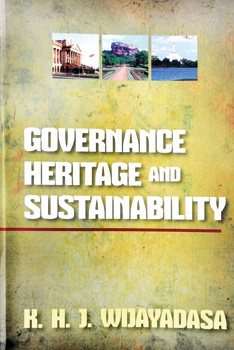
This was kind of the breeding ground of the Trotskyites of that era. My father, a school teacher, was very much interested in politics and current affairs so he used to take me by the hand when he went to attend various election meetings.”
Here the young Wijayadasa saw the likes of Philip Gunawardena and Robert Gunawardena wax eloquent, giving heavily anti-imperialist speeches which thrilled him. “This early introduction to political activity kindled my desire to be a part of the governing system. I was then only an observer but once I joined the Ceylon Civil Service I was very much at the heart of governance,” he says.
His love for the country’s heritage developed after listening to the tales from the Mahavamsa and the Dathuvamsa which he found fascinating. One story from the Dathuvamsa he vividly recalls as told to him by his mother, also a school teacher, was how the Ruwanweli Maha Seya was constructed.
“The story tells how deep the foundation was dug and how specially selected earth was brought to Anuradhapura after which buffalo hides were spread on the earth and elephants were driven round and round to consolidate the soil.
“This kind of stories made me become addicted to our heritage, our lost civilization and irrigation works.”
Growing up with five other siblings, it was once again the influence of his father that fostered his love for the environment and made him understand the need to co-exist with nature in a way that the environment is not harmed and destroyed.
“My father was a man who lived very much with nature. Where we lived as children is now a concrete jungle but during that time there were paddy fields, lots of beautiful undulating land, coconut and rubber. We grew our own vegetables and had our own bathing well,” he recalls.
The lessons on how to live in harmony with nature were not confined to the environs of the home. “With both parents being government school teachers, they were entitled to railway warrants and with these the family travelled on each vacation to different parts of the country – on pilgrimages to Anuradhapura, to Jaffna, Batticaloa and Badulla.” The train rides were used to impart vital knowledge to the children especially details of the country’s geographical make up.
“My father would explain while we were travelling from the wet zone to the intermediate zone how the vegetation and climatic conditions change and then from the intermediate zone to the arid zones how more changes take place. It was absolutely practical and down to earth teachings by observation and example.” Having developed these early interests, Wijeyadasa joined the CCS in 1960 after he completed an honours degree in Geography from the University of Ceylon, Peradeniya.
It had then been a roller coaster ride serving in various capacities as head of various government bodies, as Secretary to ministries and then for 17 years with President Premadasa – in his various capacities including Secretary when he was Prime Minister and later holding the same post when Premadasa was elected President in 1989.
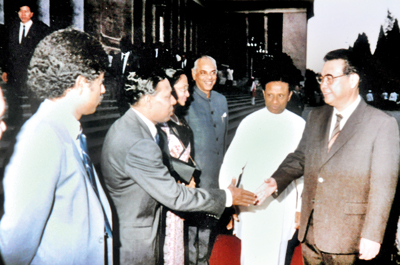
In the front line: Being introduced by President Premadasa to visiting Chinese Prime Minister Li Peng
While holding high office in the public service, Mr. Wijayadasa also pursued his passion for the environment, playing a vital role in the enactment of the National Environment Act (NEA) of 1980 as well as in the setting up of the Central Environment Authority (CEA) where he served as Chairman for ten years before stepping down. “Under the NEA it is mandatory to get an Environmental Impact Assessment (EIA) before undertaking major projects such as ports and airports but almost all of these laws are being observed in the breach these days and brushed aside lightly. The harm caused to the environment is paid no attention.”
Mr. Wijayadasa devotes two chapters in his book to highlight the deterioration of standards within the public service . Titled “Public Administers VS Political Masters” and “Harmony and Conflict Between Public Servant and Politician,” they are an eye-opener on how, over the years, the position of prestige that members of the public service enjoyed has vaporized.
“Then things were less politicized than they are today. They respected the public servants then but today they are treated like dirt. “
The book, a Sarasavi publication consists of 18 chapters and its contents have been collected by the author over a period of time. “I preserved these writings with a view to publishing them some day. Unless these writings are committed to print all of this will be lost. So I wanted to put them into print for the sake of posterity.”
As he sits on the sidelines and observes the unfolding events in the political arena in the country as well as a public service slowly losing its identity under political pressure, he is definite about one thing. “I am so glad to be out of this business now.”
Follow @timesonlinelk
comments powered by Disqus




















